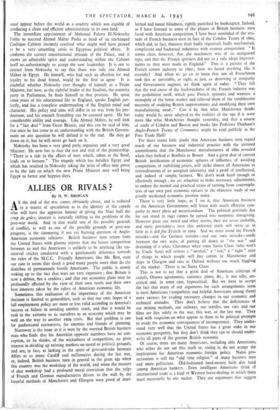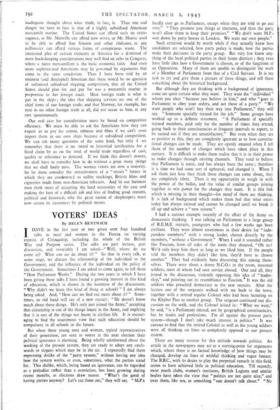ALLIES OR RIVALS?
By D. W. BROGAN
AS the end of the war comes obviously closer, and is reduced to a matter of speculation as to the identity of the espada who will have the apparent honour of giving the Nazi bull the coup de grace, interest is naturally shifting to the problems'of the post-war world. And in that world one of the possible grounds of conflict, as well as. one of the possible grounds of post-war progress, is the simmering if not yet burning question of Anglo- American economic relations. British business men return from the United States with gloomy reports that the future competition between us and the Americans is unlikely to be anything like tea- interval cricket conducted with a gentlemanly deference towards the rules of the M.C.C. Friendly Americans, like Mr. Batt, state our ease in terms that shock a good many people more than do the diatribes of permanently hostile Americans. The public is slowly waking up to the fact that wars are very expensive ; that Britain is now a debtor, hot a creditor ; and that our economic plans may be profoundly affected by the view of their own needs and their own best interests taken by the fillers of American economic life.
Sometimes this realisation of the importance of the American decision is limited to generalities, such as that our own hopes of a full employment policy are more or less- valid according to America's success or failure in avoiding another crash, and that it would be rash in the extreme to tie ourselves to an economy which may be well on the way to another 1929 crisis. But that problem is one for professional economists, for enemies and friends of planning. Narrower is the issue as it is seen by the worried British business man-who finds that his American opposite numbers have no con- ception, so he thinks, of the wickedness of competition, no great interest in dividing up existing markets on moral or political grounds, and are, in fact, as lacking in the spirit of give-and-take between Allies as so many Cardiff coal millionaires during the last war, or, indeed, British business men in general in the great age when this country was the workshop of the world, and when the masters of that workshop had a profound moral conviction that the yelps of French arid German manufacturers driven to the wall- by the forceful Methods of Manchester and Glasgow were proof of intel-
lectual and moral blindness, rightly punished by bankruptcy. Indeed, as I have listened to some of the plaints of British business men faced with American competition, I have been reminded of the atti- tude of French business men in face of the Cobden Treaty of i86o, which did, in fact, threaten their badly organised, badly mechanised,
complacent and backward industries with ruinous competition. "It
seems clear, however, that the machinery was of an antiquated type, and that the French spinners did not as a rule adopt improve- ments as they were made in England." This is a picture of the French cotton industry in 1860; have we heard anything like it recently? And when we go on to learn that not all Frenchmen took this as inevitable, as right, as just, as deserving of sympathy and Government support, we think again .of today. 'f They felt that the real cause of the backwardness of the French industry was
the prohibitive tariff, which gave French spinners and weavers a monopoly of the home market and relieved them of the troublesome necessity of studying British improvements and modifying their own manufacturing -needs." Can it be that what Manchester thinks today would be more adapted to the realities of the age if it were more like what Manchester thought yesterday, and that a course of study of Cobden and Bastiat and books like Professor Dunham's Anglo-French Treaty of Commerce might be read publicly in the Free Trade Hall?
For there seems little doubt that American business men regard much of our business and industrial practice with the irritated astonishment that the Manchester manufacturers of 186o revealed when they looked at Roubaix or Rouen And a great deal of current British justification of economic spheres of influence, of avoiding competition, of stabilising prices, will strike almost all Americans as rationalisations of an accepted inferiority and a proof of intellectual, and indeed of simple, laziness. We don't work hard enough or effectively enough ; we are reluctant to make necessary adjustments, to endure the mental and practical strain of turning from contempla- tion of our own past economic virtues to the objective study of our greatly weakened economic position today.
There is very little hope, as I see it, that American business or the American Government will listen with much effective sym- pathy to mere pleas ad misericordiam. The political gratitude due for our stand in 1943 cannot be turned into economic almsgiving. However great our moral and other Merits, they are never cashable, and mere peevishness over this awkward truth will serve us as little as it did.the French in 1919. And we must avoid the French mistake—and the German mistake—and our own mistake—made between the two wars, of putting all down to "the war" and dreaming of a white Christmas when some Santa Claus (who won't be Uncle Sam) will restore a "normal," a "fair," a " right " state of things in which people will buy cotton in Manchester and ships in Glasgow and cars in Oxford without too much higgling of the market. There is no Santa Claus.
This is not to say that a great deal of American criticism of cartels, Ottawa agreements, currency plans, &c., is not silly, un- critical and, in some case, hypocritical. But we have to accept the fact that many of our arguments for such arrangements seem to most Americans (sympathetic and helpful Americans among them) mere excuses for evading necessary changes in our economic and technical attitudes. They don't believe that the deficiencies of our mining methods, our railways, our textiles, our cars and our films are due solely to the war, this war, or the last war. They look with suspicion on what appear to them to be political attempts; to evade the economic consequences of incompetence. They under- stand very well that the United States has a great stake in our economic prosperity, but they don't think they can or should under- write all parts of the present British economy.
Of course, there are many Americans, including able Americans, who either do not see this truth or, seeing it, do not accept the implications for American economic foreign policy. Naïve pro- tectionism is still the "old time religion" of many business men and more politicians. Old-fashioned hard-money faith dies hard among American bankers. Even intelligent Americans think of international trade as a kind of Western horse-dealing in which there must necessarily be one sucker. They use arguments that suggest
inadequate thought about what trade, in fact, is. Thus one real danger we have to face is that of a highly subsidised American mercantile marine. The United States can afford such an extra- vagance, as Mr. Manville can afford new wives, or Mr. Hearst used to be able to afford San Simeon and other châteaux, as any millionaire can afford various forms of conspicuous waste. The interested plea of certain elements in America for a dismissal of mere book-keeping considerations may well find an echo in Congress, where a naive mercantilism is the basic economic faith. And even more sophisticated Americans may be governed by arguments that come to the same conclusion. Thus I have been told by an eminent (and Anglophil) American that there wou:d be no question of unlimited subsidised shipping competition, that all the United States should plan for and pay for was a mercantile marine in proportion to her foreign trade. Here foreign trade is what is put in the ships ; the idea that shipping services are one of the chief items of our foreign trade, and that Norway, for example, has next to no other foreign trade at all, did not occur to him, at any rate spontaneously.
Our real case for consideration must be based on competitive efficiency. We must be able to ask the Americans how they can expect us to pay for cotton, tobacco and films if we can't even import them in our own ships because of subsidised competition. We can ask many questions of the same kind, but only if we remember that there is no moral or historical justification for a fixed claim by us on the total of world trade regardless of cost, quality or relevance to demand. If. .we think this doesn't matter, we shall have to consider how to do without a great many things that we shall badly miss. The women voters are now a majority. So let them consider the attractiveness of a " secure " future in which they are conckmnesi to utility stockings, British films and cigarettes made from non-American tobaccos. And let our business men think more of accepting the hard necessities of the case and making the best of a difficult job and less of finding good reasons, political and historical, why the great nation of shopkeepers must now secure its customers by political means.



























 Previous page
Previous page